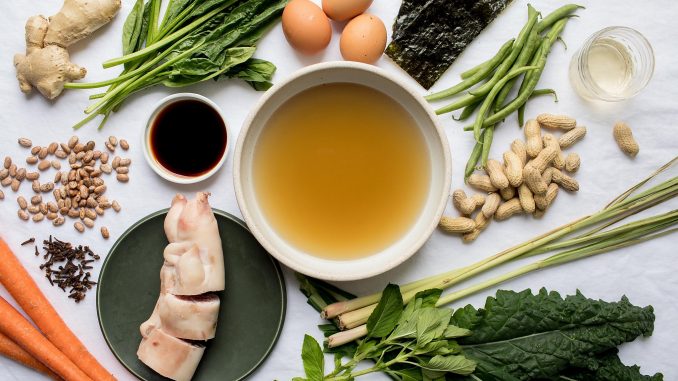
[ad_1]
When Dr. Marilyn Wong gave birth to her daughters over 40 years ago in San Francisco, her mother invited her to stay at her home for a month. Wong, a Hong Kong immigrant and now a retired public health physician, rested and focused on breastfeeding while her mom cooked her traditional Chinese postpartum dishes like ginger vinegar with pigs feet and eggs, and chicken wine soup.
She didn’t know it then, but Wong was participating in centuries-old postpartum (post-birth) traditions that include eating foods that help new moms heal and breastfeed called sitting the month (zuo yuezi in China). Cultures around the world have their own postpartum traditions and recipes similar to sitting the month: la cuarentena in Latin America, omugwo in Nigeria’s Igbo tribe, yu duan in Thailand. The U.S. has been slowly warming up to using food as medicine, but the rest of the world has been on that train for centuries.
After three pregnancies with gestational diabetes and severe preeclampsia, my postpartum meals were mostly Mexican Coke and Tartine almond croissants because I wanted sugar and comfort. I had the privilege of postpartum help thanks to my doula and my mom, but no knowledge that food could help me heal and breastfeed. I struggled with both after my first birth (an emergency C-section with blood transfusions); my body took months to heal.
In the U.S., we don’t talk much about postpartum care or nutrition. A new mom’s first checkup happens six weeks after birth, and there is no national paid maternity leave. It’s not a shock that the latest estimates from the Centers for Disease Control and Prevention show that the U.S. has the worst maternal mortality rate compared to nine other wealthy countries, with non-Hispanic black women dying more than twice as much as non-Hispanic white women and three times as much as Hispanic women.
Wong believes that this can change if we rebuild the culture surrounding postpartum care and nutrition. It needs to be people-centered, justice-based and adapted to our current society. “In the past, your community or village would cook traditional postpartum meals and take care of you,” Wong says. “In the U.S., we don’t have that. We’ve lost this cultural postpartum knowledge because of racism, sexism and profit-based health care.” She founded a volunteer organization called Mothers to Mothers or M2M, which studies and promotes cross-cultural postpartum knowledge and justice, often through food.
Wong never got a chance to get the postpartum recipes from her mother before she passed. So it’s fitting that M2M started as an undergraduate project for a class Wong taught Asian American Pacific Islander students at UC Berkeley in 2014, where they collected postpartum recipes from family. In 2017, they self-published a book called “From Mothers to Mothers: A Collection of Traditional Asian Postpartum Recipes.” Each recipe is printed in its native language and English, and they raised funds to donate copies to local clinics and nonprofits working with low-income Asian American populations.
After a good reception, they took it further. “I didn’t want people to think that these recipes were just old wives’ tales,” Wong explains. “I wanted to show them the nutrition in it.” She partnered with UC Berkeley dieticians and their students to analyze recipes that were sent to them and from the cookbook, and put the recipes and results on their website.

“Each culture has a lactation ingredient and a healing ingredient,” Wong explains. In the ginger vinegar with pigs feet and eggs that she ate postpartum, the ginger heals by reducing inflammation, boosting the immune system with Vitamin C and making bowel movements easier with fiber. The protein in the egg also heals by repairing muscle and tissue. The pigs feet provide calories and calcium for milk production and recovery, and the black sweet vinegar helps retain energy and possibly reduces postpartum depression.
Food activist, chef and M2M team member Aileen Suzara experienced the benefits of having her community make her cross-cultural postpartum foods when she had her first child in 2019. Suzara, a Filipina, ate Filipino tinola, a chicken soup with green papaya (boosts milk supply, provides vitamins) and moringa leaves (boosts milk supply and calcium, is anti-inflammatory and helps with blood clots); panjeri from her Punjabi mother in-law, an Indian dessert with lots of nuts (protein) and fenugreek (boosts milk supply); rice porridge (carbs for energy), and sardines and cheese (foods she craved).
“When we care for postpartum families, there are mental and physical benefits,” Suzara says. “When we cultivate practices of care, it creates a ripple effect of care that permeates society.”
M2M wants to modernize that community postpartum support with their latest project, Nourish. The first stage focuses on restaurants.
“I thought, how do people get food today? From restaurants, food delivery apps. Can we rally restaurants to be part of this community?” Wong says.
M2M has a team of dieticians and graduate students identifying dishes at restaurants in the Bay Area that help postpartum mothers, which they put up on their site. Friends and family can get new moms these dishes or gift certificates from the restaurants and help nourish them. Wong’s dream is to partner with food delivery apps that can put these dishes in a special section for new moms, making it even easier to access.

M2M launched the program two months early in March in response to the pandemic, with 15 restaurants and 32 dishes, and asked local and state governments to declare low-income postpartum women as a vulnerable population so they can qualify for pandemic meal programs.
Many of the Nourish dishes were already on restaurant menus, like the black bean soup at Cosecha in Oakland. Chef owner Dominica Rice-Cisneros says that it’s a flavor her family craves, and she loves how the beans provide new moms with iron and protein (and also fiber, says M2M dietician Jing Liu).
At Radio Africa Kitchen in San Francisco, chef Eskender Aseged took a traditional Ethiopian postpartum dish, genfo (wheat porridge with niter kibbeh, a spiced clarified butter) and updated it using American ingredients. His alicha with corn and cracked quinoa ugali makes grits out of quinoa (high in protein and fiber, which helps healing), replaces clarified butter with California olive oil (gives it flavor and helps absorb amino acids and nutrients) and pairs it with alicha, seasonal vegetables cooked with mild spices like ginger, cumin and turmeric (vitamins, minerals and antioxidants help with healing and breastfeeding).
Chef Malinda Bun, owner of Cambodian Street Food in Oakland, survived all four of her postpartum experiences thanks to traditional Cambodian dishes her mom made her, especially banana blossom chicken soup, made with unripe banana blossoms. It’s now on their menu because of Nourish.
“My mom says that this soup is what they used back in the country because they didn’t have any medication,” Bun explains. Bun says it helped her heal quickly from her C-section and gave her energy. Liu confirmed that banana blossoms offer a complete set of nutrients (potassium, vitamins and fatty acids that help you absorb vitamins already in your body).
The next stage of Nourish involves feeding black and indigenous communities. M2M is working with Black Women Birthing Justice which, along with Diversity Uplifts and Frontline Doulas, received a grant to respond to COVID-19’s effect on low-income, at-risk black moms. Linda Jones, a Bay Area birth and postpartum doula for 30 years and one of the organization’s founding members, says that part of the grant will hire black postpartum doulas to help 50 black families in California for six weeks.
In Alameda county, 10 families will also receive a weekly meal box from Nourish (gathered from participating restaurants) starting in July, which will be delivered by the doula. “Because of all of the inequities that black moms face … having the doulas give these boxes of nourishing food and check in with them for six weeks is gonna be a game changer,” Jones says.
M2M also plans on working with Roots Community Health Center in East Oakland to provide the meal boxes to their new moms, and with Mandela Partners to provide snack boxes with fruits, vegetables and nuts. Local chef, activist and author Bryant Terry has been advising for M2M since its start.
“Mothers to Mothers does such powerful work centering the needs of the most impacted communities,” he says. “Providing hot nourishing meals and snack boxes to vulnerable new moms in black and indigenous communities is an important piece in a larger puzzle.”
M2M will be launching a campaign to raise $30,000 to help fund the next stage of the project. It’s a big step for the country’s first postpartum nourishment project that’s entirely volunteer-based.
Nutrition 101 for postpartum recovery
Jing Liu, Mothers to Mothers’ lead dietician, shared tips for postpartum eating. Liu says that cooked food is easier for the body to digest than raw food. She looks for foods that have several healing and breastfeeding ingredients together, so moms can get the most nutrition with the least amount of effort.
Soup is especially good because it’s nutrient-dense, soothing and hydrating (good for breastfeeding). Protein is great for breastfeeding and healing (rebuilds muscle and tissue); anti-inflammatory ingredients and antioxidants also help the body heal quicker. Fiber is essential for bowel movements because the abdominal area isn’t functioning optimally after birth. Some ingredients help boost milk supply, while calcium prevents bone loss from breastfeeding. Carbohydrates in moderation provide good energy. Get Mothers to Mothers recipes here: https://www.m2mpostpartum.org/recipes
Popular ingredients
Chicken: lean, complete protein
Ginger: anti-inflammatory, fiber, boosts immune system, improves appetite, reduces pain
Eggs: protein
Lemongrass: regulates blood pressure (good for preeclampsia recovery)
Leafy greens: nondairy calcium, iron, vitamins A, K and C
Milk: calcium, protein
Chicken broth: calcium, magnesium, minerals, boosts immunity
Rice: carbs
Beans: fiber, protein, iron,
Nuts: protein, energy
Seaweed: minerals, antioxidants, anti-inflammatory
Fenugreek seeds: boosts milk supply
Garlic: fiber, boosts milk production
Cinnamon: lowers blood sugar (good for gestational diabetes recovery)
Vegetables: vitamins, minerals, antioxidants
“I’m excited … justice is also about building the strength of the community,” Wong says. “Black mamas and their babies are the backbone and the future of their community.”
M2M can be found at www.m2mpostpartum.org.
Leena Trivedi-Grenier is a freelance writer living in the Bay Area. Email: [email protected] Instagram: @leenaeats Twitter: @Leena_Eats
[ad_2]
Source link Google News








